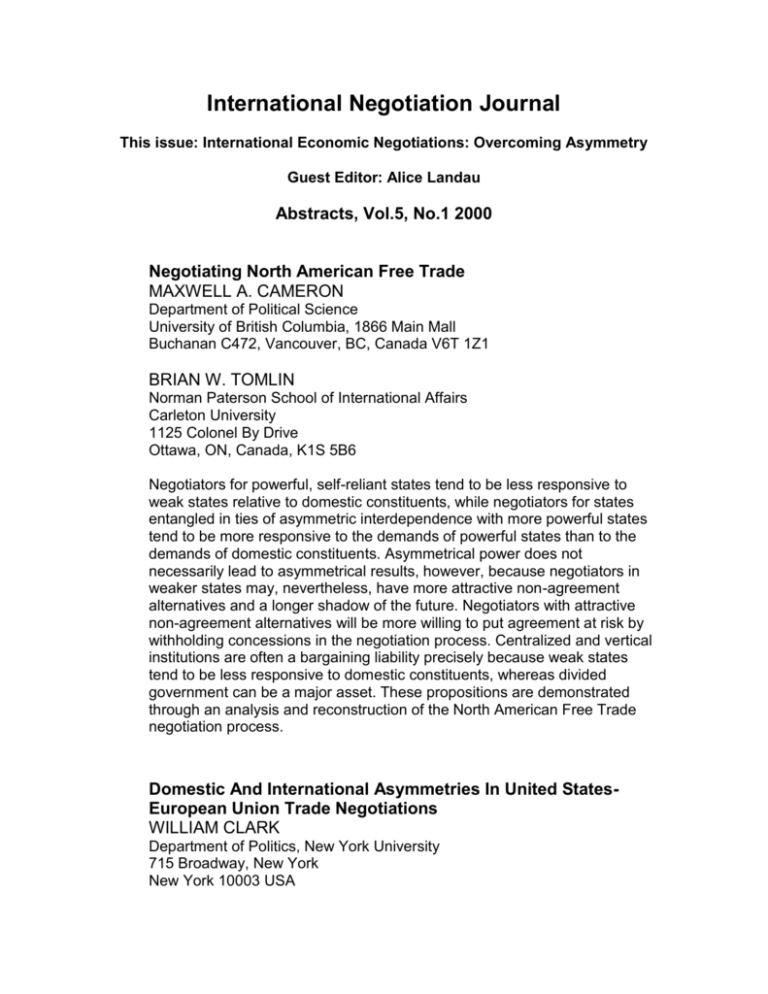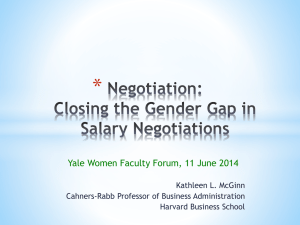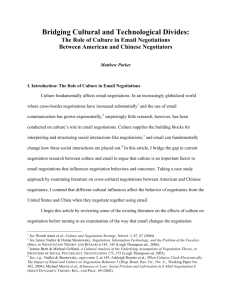No. 1 International Economic Negotiations
advertisement

International Negotiation Journal This issue: International Economic Negotiations: Overcoming Asymmetry Guest Editor: Alice Landau Abstracts, Vol.5, No.1 2000 Negotiating North American Free Trade MAXWELL A. CAMERON Department of Political Science University of British Columbia, 1866 Main Mall Buchanan C472, Vancouver, BC, Canada V6T 1Z1 BRIAN W. TOMLIN Norman Paterson School of International Affairs Carleton University 1125 Colonel By Drive Ottawa, ON, Canada, K1S 5B6 Negotiators for powerful, self-reliant states tend to be less responsive to weak states relative to domestic constituents, while negotiators for states entangled in ties of asymmetric interdependence with more powerful states tend to be more responsive to the demands of powerful states than to the demands of domestic constituents. Asymmetrical power does not necessarily lead to asymmetrical results, however, because negotiators in weaker states may, nevertheless, have more attractive non-agreement alternatives and a longer shadow of the future. Negotiators with attractive non-agreement alternatives will be more willing to put agreement at risk by withholding concessions in the negotiation process. Centralized and vertical institutions are often a bargaining liability precisely because weak states tend to be less responsive to domestic constituents, whereas divided government can be a major asset. These propositions are demonstrated through an analysis and reconstruction of the North American Free Trade negotiation process. Domestic And International Asymmetries In United StatesEuropean Union Trade Negotiations WILLIAM CLARK Department of Politics, New York University 715 Broadway, New York New York 10003 USA ERICK DUCHESNE Department of Political Science, University at Buffalo The State University of New York 520 Park Hall, Buffalo, NY 14226 USA SOPHIE MEUNIER Center of International Studies, Princeton University Bendheim Hall, Princeton NJ 08540 USA This article studies the determinants of international bargaining power in instances of trade negotiations between the European Union and the United States. The authors' central hypothesis is that an appraisal of the US-EU trade relationship requires an understanding of the ways in which "domestic" political institutions shape the bargaining behavior of international actors. In particular, this article argues that the frequent EU "successes" in its negotiations with the US are the result of the bargaining power that its unique institutional arrangements grant its negotiators. In order to explain the distributional outcomes of international trade negotiations, the authors explore the "Schelling conjecture" and analyze why it is particularly relevant to the understanding of the unique bargaining power of EU negotiators when they are confronted with their American counterparts. To examine the explanatory power of domestic institutions in episodes of trade negotiations, the article analyzes the US-EC Uruguay Round agricultural negotiations (1986-1993). (Mis)Managing Diversity: Worker Rights and US Trade Policy KIMBERLY ANN ELLIOTT Institute for International Economics Suite 620, 11 Dupont Circle NW Washington, DC 20036, USA The metaphor of the two-level game has been used to describe the process whereby political leaders find themselves negotiating simultaneously at the domestic and international tables when trying to reach international cooperative agreements. This article examines the role of domestic politics in the US debate over trade policy in recent years. Specifically, the article analyzes the bargaining between the Clinton administration and the US Congress over the appropriate role for labor (and environmental) issues in trade negotiations in the context of the debate over so-called-fast-tracknegotiating authority. The article then goes on to analyze how the domestic politics of this issue could affect an international negotiation over worker rights in the World Trade Organization. Negotiations to Set Up Joint Ventures In China GUY OLIVIER FAURE UFR de Sciences Sociales, Paris V, Université de la Sorbonne 12 rue Cujas, 75005 Paris France and China-Europe International Business School Shanghai, China Establishing joint ventures in China is an interesting test of cross-cultural negotiation under conditions of uncertainty within a complex network of constraints. On one side is the huge Chinese company, heavily bureaucratic and focused on taking care of all dimensions of its employees lives. On the other side is the Western enterprise focused on quality performance and financial effectiveness. Tthe negotiation process can be distinguished by several stages, each of them related to a specific issue such as the basic policy of the future joint venture, the technical issues, the financial aspects, and the legal aspects. Among many issues, 16 are considered in this analysis as key issues of crucial importance in the building up of the agreement. A number of difficulties encountered by both parties during the negotiation are scrutinized such as hidden differences in objectives, the obstacles due to non-overlapping perceptions, the lack of managerial culture, conflicting values behind behaviors, and the decisionmaking process in an administration-run economy. Analyzing International Economic Negotiations: Towards a Synthesis of Approaches ALICE LANDAU Department of Political Science , University of Geneva 102 Boulevard Carl Vogt 1205 Geneva, Switzerland Economic negotiations have unique structural characteristics and deserve special scrutiny. These attributes entail the institutional frameworks in which issues are placed and the actors involved. Economic negotiations can be conducted at bilateral, regional or multilateral levels. They are not one-shot exercises, so countries can play off multilateral options when they have better bilateral or regional alternatives and vice versa. Economic negotiations are often networked into other negotiations to constitute an intricate and interlinked pattern of relations. They also can become complex in terms of the number of agents involved in the process and the multiple levels of interaction. Finally, they have specific structural configurations of their own. The OECD Agreement to Criminalize Bribery: A Negotiation Analytic Perspective DAVID METCALFE Program on Negotiation, 513 Pound Hall, Harvard Law School Cambridge MA 02138, United States This article examines a negotiation under the auspices of the Organization for Economic Co-operation and Development (OECD) on a Convention Combating Bribery of Foreign Public Officials in International Business Transactions. We view the OECD negotiation as the culmination of 20 years of US diplomatic pressure. The investigation provides a detailed description of the Bribery Convention in terms of negotiators’ preferences. To accomplish this we structure the talks within a negotiation analytic framework specifying parties, issues, resolutions, preferences, and reservation values. Preference data for the ten largest OECD exporters are presented. This permits the outcome to be described in quantitative terms. Pushing the analysis forward, we assess the impact on the negotiation process of the addition of a highly divisive issue. The divisive issue splits the parties into two coalitions, threatens deadlock, and is left unresolved until the final hours of the negotiation, setting up a game of Chicken. This study offers lessons for the management of future international economic negotiations. Complex multiparty negotiations can benefit from small teams of facilitators focused on designing and managing the negotiation process. Symmetry and Asymmetry in International Negotiations FRANK R. PFETSCH University of Heidelberg, Heidelberg, Germany ALICE LANDAU Department of Political Science, University of Geneva Switzerland The properties of symmetry and asymmetry among negotiating partners can influence the process and outcomes of a negotiation in four major ways. First, they describe the relative potential strengths and power of the negotiating parties and, as such, not only indicate differences and similarities that exist between the negotiating partners, but also determine the process. Second, even asymmetric parties seek to find equality through the process of negotiation. A third form of symmetry and asymmetry is manifest when a third party is engaged to mediate the negotiation process. Finally, the outcome of the negotiation process expresses utility perceptions by both parties. Thus the idea of symmetry/asymmetry and the perception, there of, can be found in all stages of the negotiation process.








